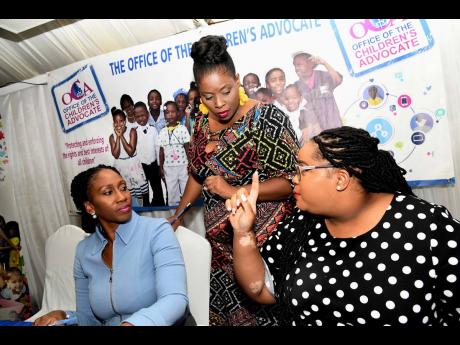OCA concerned about numbers contacting SafeSpot for support
DIAHANN GORDON Harrison, Children’s Advocate of Jamaica, is concerned about the alarming number of children who directly contacted Jamaica’s national child and teenager helpline, SafeSpot, during its operations in 2022.
SafeSpot was officially launched on May 19, 2021. And during 2022, a total of 2,345 contacts were made to SafeSpot through calls to the 24/7 toll-free landline (888-723-3776) or sending messages via the online platforms (@safespotja) on WhatsApp, BiP, Instagram, and Snapchat. Eighty-five per cent of the contacts were from children making direct reports.
The most common issue that required support from SafeSpot was categorised as mental health, with 56 per cent of the child callers or contacts indicating that they needed support for suicidal thoughts and attempts (135), self-harming behaviours (90), fear and anxiety (111), and other unspecified mental-health concerns (450).
The majority of those seeking assistance were aged 16-17, whose main platform for interaction was WhatsApp messages. SafeSpot also caters to children with special needs.
“We had the youngest person reaching out to us being a three-year-old, and it ranged beyond our intended audience of capping it at 18 years because we had some persons up to age 24 who were reaching out to SafeSpot for advice and guidance over the period,” Gordon Harrison said. “SafeSpot is indeed reaching children all across the nation, and more importantly, children all across the nation are experiencing issues that they wish to get some assistance with.
“If we look at the contacts by location, for the contacts that did disclose their location, the majority of them resided in what we call the cities of Jamaica, and of course, because we are using a software that’s not built in Jamaica, they have categorised cities as Kingston and St Andrew, and St Catherine has been incorporated into that,” she explained.
Most of the contacts, it was revealed, did not disclose the location of their issues, but those who did were primarily females, who indicated that the issue requiring support manifested itself in their own home. This factor, Gordon Harrison said, is of serious concern.
“It [issue] was not what was happening in the community. It wasn’t what was happening at church or at school. It was an issue that they were concerned about in their own home ... and we had, overwhelmingly, 603 females who indicated that they had issues at home that they were challenged with, and 148 boys, who also shared the same concern,” Gordon Harrison said.
Claudette Pious, co-founder and executive director, Children First, expressed concern about the overall strategy to tackle issues faced by “troubled children”.
“I work in St Catherine. We have done a lot of referrals to SafeSpot. I am very concerned, though, in terms of a national strategy in reaching our troubled children. We’re still not there, and with all the work we’re doing ... we’re not looking at a comprehensive child support system, and that for me is a concern,” Pious said.
Dr Juliet Leiba, director, Child and Adolescent Mental Health, Ministry of Health and Wellness, said education is important.
“We started with mental-health literacy because we feel that infusing recognition and acceptance of mental health, the need for good mental health, and also to reduce the stigma, that’s a big, big thing in Jamaica. It is a must at this time,” Dr Leiba said.
“PAHO (Pan American Health Organisation) has recently rolled out a guide for the primary school ,” she continued. “So I feel that the schools are where we have to permeate and penetrate in terms of recognition of the need for mental health (education), reducing the stigma, primary prevention and primary care, and increase in health-seeking behaviour so that they won’t feel like something is wrong with me going to the psychologist or even going to the guidance counsellor.”

